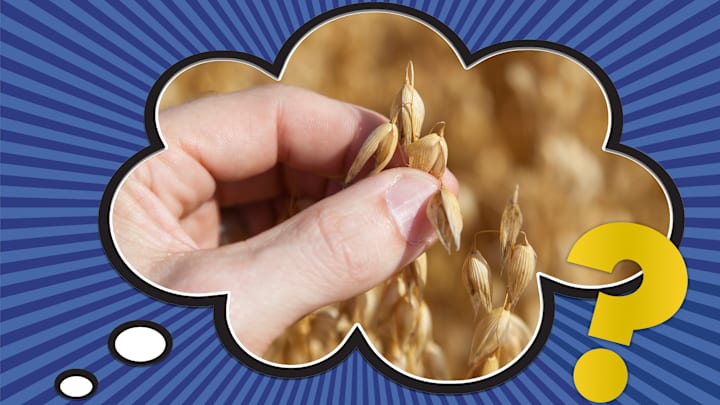When someone wanders outside the boundaries of maturity, we tend to say that they’re “feeling their oats.” Feeling frisky? Out overnight and until the wee hours of the morning? Avoiding responsibility? Embracing newfound authority? You’re simply feeling those oats.
- The First Uses of Feeling One’s Oats
- Horsing Around
- Other Oats-Related Phrases
- Read More About Word and Phrase Origins:
The First Uses of Feeling One’s Oats
The Oxford English Dictionary defines to feel one’s oats as meaning “to be lively; to feel self-important.” Though it’s not known how long ago the term was being bandied about, it appears that it first began turning up in print in the 1800s. Here’s an example from 1848, which ran in newspapers around the country (emphasis in the original): “The high sheriff of an almighty small settlement in Indiana, who had arose to that tall niche in official dignity, from them ere lees of pettifogging, knowing the law, and feeling his oats, determined to do his duty up to the handle ...”
The term remains popular today; recently, it’s been used to describe the attitude of a football player and in a review of Greta Gerwig’s Barbie in 2023 (spoilers): “Feeling his oats, Ken thinks he can take this mindset back to Barbieland—which quickly becomes ‘Kendom.’”
But how did fondling grains become an idiom for uninhibited behavior? The phrase is not really intended to refer to the tactile act of rubbing oats, but experiencing the effects of ingesting them. As a horse.
Horsing Around
When a horse is fed oats instead of the hay or grass it’s accustomed to, they tend to get a burst of energy. Galloping around, the horses seem to be imbued with a new drive. They stride with confidence and purpose. They seem to stand a little taller. They’re feeling those oats. “Whether the pony felt his oats ... He took a frightful canter,” says an 1831 source noted in the OED.
Horses typically get oats when they need some quick energy from starches and sugars, though there’s a good amount of protein and B vitamins in there, too. Unlike other starches, horses can munch on oats raw. Then, presumably, they tear it up. This is especially true of racehorses, who might consume up to 35,000 calories a day, some of it in the form of oats or processed feed with more fats and fiber.

Not all horses do well with oats, however. Some may not produce enough of the amylase enzyme needed to break them down properly, or the horse might have a gluten allergy. In those cases, you wouldn’t want a horse to be feeling his oats.
Other Oats-Related Phrases
Feeling one’s oats is far from the only oats-related phrase out there. The phrase sow your wild oats also stems from carbohydrates. In this case, wild oats don’t really need to be sown, as they grow easily. To sow wild oats is to exhibit some needless frenzy of activity.
Off one’s oats, per the OED, is a 19th-century phrase someone might use when they have no appetite. And to get one’s oats is a British slang term meaning “to achieve sexual gratification” that dates back to the 1920s. And users of Cockney rhyming slang might be familiar with the phrase oats and chaff, meaning “footpath.”
So go ahead and feel those oats, sow them, or do whatever else you’re inclined to do.
Read More About Word and Phrase Origins:
A version of this story ran in 2021; it has been updated for 2024.
